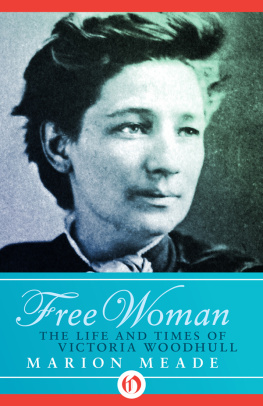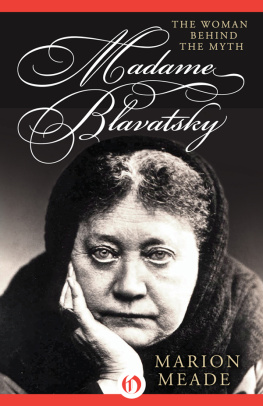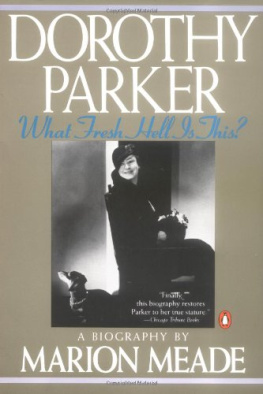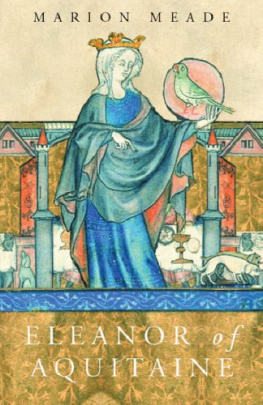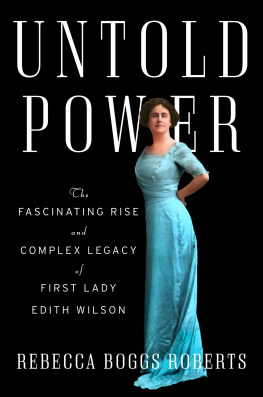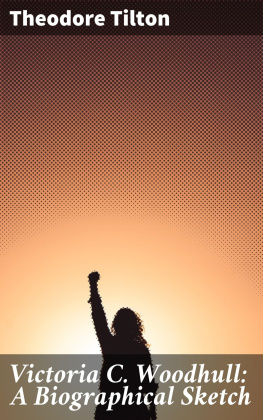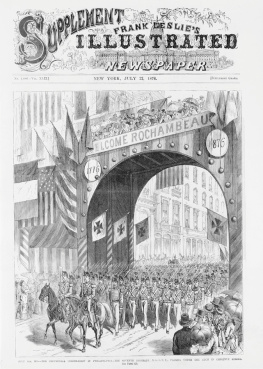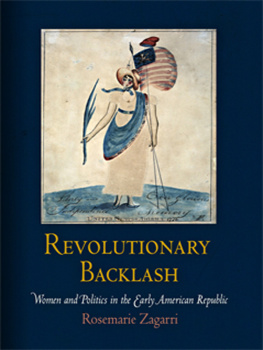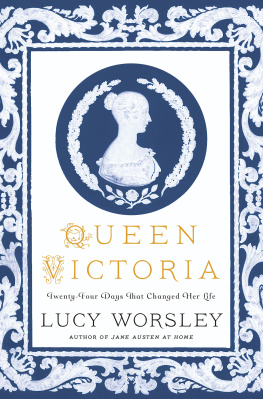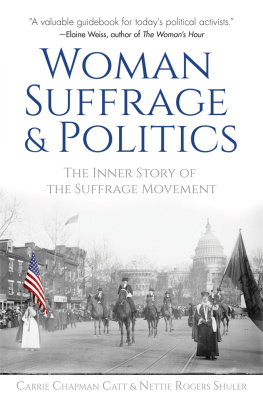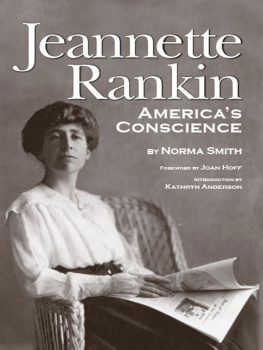Free Woman
The Life And Times Of Victoria Woodhull
Marion Meade

Acknowledgments
For their help during my research for this book, I would like to thank the staffs of the Sophia Smith Collection at Smith College, the Schlesinger Library at Radcliffe College, and the New-York Historical Society.
For my daughterAlison
Foreword
The Presidential election of 1920 was one of the most important in U.S. history. This ground-breaking event marked the first time that women were eligible to vote, and millions of them showed up at the polls. (Republican Warren G. Harding was elected.)
After a seven decades-long battle for the vote, who remembered, for instance, the historic election of 1872 won by the incumbent Ulysses S. Grantan election noteworthy because another of the candidates that year was a woman. Not that people had taken Victoria Woodhull seriously at the time.
I am too many years ahead of this age, observed Woodhull, and that is exactly right. As there was no place for her in the 19th century she was soon forgotten. But in the 1970s, when another generation of feminists was banding together to fight for their civil rights, her accomplishments seemed worth celebrating. Was the time ripe for a comeback, I wondered?
Victoria Claflin Woodhull was an intense, statuesque beauty, one of ten children born to a poor family in Homer, Ohio. After only a few years of schooling she married at fifteen and had two children with a husband who turned out to be an alcoholic.
And yet, astonishingly, just a dozen years later she and her sister Tennessee rolled into New York City and proceeded to make a name for themselves in the business world. With backing from the tycoon Cornelius Vanderbilt, the independent-minded sisters embarked on two unprecedented ventures: a Wall Street investment firm, and a muckraking newspaper (it once printed Marx and Engels Communist Manifesto).
For years, feminists had struggled to win equal rights. Along came Woodhull, aglow with confidence. What set the outsider apart from other activists was a combination of brains, beauty, and brass.
Doyennes of the womens rights movement initially turned up their noses at Woodhull. The power players at the time were Susan B. Anthony, a sober 50-year- old unmarried former teacher, and Elizabeth Cady Stanton, 55-year-old wife of an attorney and mother of seven. For years this conservative team, along with many other veteran feminists, had toiled over practical strategies to bring about change. The ambitious Woodhull pressed ahead without much regard for their hard work or their safe political methods. Confrontational, she had views of her own. In addition, she personally was not entirely respectable. Unlike most women she worked outside the home, and she was also divorced with a messy private life. Clearly she was a person they couldnt ignore, and so despite misgivings the suffragists determined to work with her.
She scooped the honor of being the first woman to address Congress. Before the House Judiciary Committee, she presented legal arguments to prove that the Constitution already gave women the right to vote. The 14th and 15th Amendments granted that right to all citizens. Were not women citizens?
If the feminist establishment had a problem with Woodhulls controversial political approach, the average American found utterly shocking her advanced views on sexual freedom (dubbed free love in the 19th century). In all matters, personal and political, she rejected the double standard. As a result, she was presumed to be a prostitute.
For a time, Woodhull was one of the most prominent women in the whole country. She kept making news:
first female stockbroker
first woman to publish her own weekly newspaper
first woman to address Congress
first woman to run for President, on the Equal Rights party ticket
After that it was downhill, though, because her fighting spirit broke, little by little. Marrying a banker, she moved to England, where politics would play no part in her life. She lived to see American women get the vote, dying in 1927 at the age of 88.
A modest biography of Woodhull would, I hoped, bring her back to public view. For me, the book was a restoration project, as well as a labor of love.
In pre-computer days, biographers wrote on typewritersmine was a trim little Olivetti Lettera 22and we gathered our material by old-fashioned foot work. Without the Internet, we were obliged to trot from library to library, filling out call slips and making notes on 3 x 5 index cards. Much of my research was done at the New-York Historical Society, Columbias Butler Library, and the Boston Public Library. Copies of Woodhull and Claflins Weekly were available on microfilm at the New York Public Library. My odyssey took me to Vassar, Radcliffe, and Smith to consult their extensive files on the suffrage movement. I also managed to locate a rare 1928 biography with the repugnant title, The Terrible Siren, a deplorable portrayal of Woodhull as a trashy tabloid celebrity.
Free Woman was published by Alfred A. Knopf as a young adult biography in 1976. I would have earned more working at Burger King. The publisher paid an advance against royalties of $1,500 and invited me to a company book party at a Third Avenue ice cream parlor in Manhattan.
From time to time, I received inquiries about optioning the book for a biopic, but enthusiasm never translated into a movie. Then, in 1980, a lavish musical about Woodhull opened on Broadway. This show, wrote one critic, looks like a dinner theater's homegrown answer to "Hello, Dolly!" and it's becalmed almost to a fault. You want a good night's sleep? Pay your money and rest in peace. Unsurprisingly, Onward Victoria closed after a single performance.
Several dozen countries have been governed by female presidents or prime ministers by now, some of the most famous women being Margaret Thatcher, Golda Meir, and Indira Gandhi. In the U.S., California congresswoman Nancy Pelosi, former Speaker of the House of Representatives (2007-2011), was third in line for the office of President (after Vice President Joseph Biden).
And of course Hillary Rodham Clinton narrowly lost her bid for the Democratic nomination to Barack Obama.
No doubt, history is still catching up to Victoria Woodhull.
Marion Meade
January 2011
New York City
Preface
She was the first woman in American history to seek the Presidency; in most people's eyes that made her a monster. Among the mildest of the names they called her was "Mrs. Satan." In 1872 the notion of a woman President had sufficient power to shock most people. In an age when females were thought too ignorant to vote, it was a revolutionary idea.
Perhaps others before her may have shared the dream; if so, they never dared expose themselves to ridicule. Political ambition was considered, to say the least, unwomanly. For that matter, any kind of worldly ambition was thought to be unnatural for a woman.
After all, those who had given birth to our nation weren't called the Founding Fathers for nothing. Yes, America had been a brave new experiment in government. True, we were a democracy proclaiming liberty and justice for all. But the question of who shall lead and who shall follow had been decided at the outset. Indeed, it had never even been debated. Politics was deemed a suitable occupation only for men.
Where were the Founding Mothers? They were home raising their children, cooking, and keeping house. These functions are important, and they were even more vital to life in frontier days than now, but women lacked the freedom to choose other work. A woman with political ambitions kept them to herself. If she were extraordinarily lucky, she might marry a man who would someday win high office and then she could be a First Lady. To wish for more was madness and delusion.

